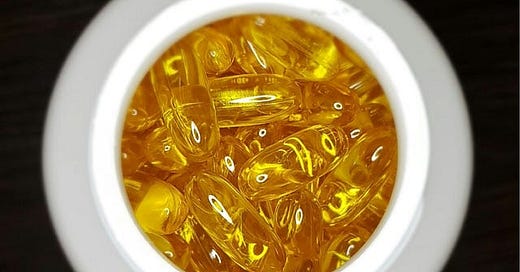The Antioxidant Shield: How Vitamin E Protects Your Brain and Body

Last week, I gave two different talks — one on prostate cancer and the other on breast cancer. What continues to strike me is how everyday products and habits are silently increasing our risk of developing serious illnesses.
Take plastics, for example, which are found in bottled water and disposable products. These tiny plastic particles in food, water, and even the air — can disrupt your hormones, increasing your vulnerability to metabolic diseases and cancers. Then, there’s excessive blue light exposure from phones and smart devices, especially at night. These seemingly harmless parts of modern life accumulate stress in the body over time.
While civilization has brought tremendous convenience, it has also introduced new health risks: Heart disease, neurodegenerative disorders, metabolic conditions, and cancer are all rising.
Today, I want to share something simple yet powerful that you can add to your lifestyle to help combat this damage:
Vitamin E: The Ultimate Cell Protector
What is Vitamin E?
Vitamin E is a fat-soluble antioxidant that protects your cells from damage caused by free radicals— unstable molecules that result from pollution, radiation, smoking, and even digestion.
How does it work in the body?
Vitamin E works as an antioxidant, neutralizing free radicals and protecting your cells, tissues, and even your DNA - it can help delay or reduce the risk of conditions like Alzheimer’s disease, heart disease, and certain cancers.
What have controlled studies shown?
Some research suggests that 8mg of Vitamin E per day can cut the risk of Alzheimer’s disease by up to 50%. That’s huge, considering how devastating the condition is. Other studies have shown benefits in immune support, skin health, and cardiovascular protection.
Recommended Daily Dose of Vitamin E:
Adults: 15 mg/day
The need may be slightly higher in certain groups (e.g., smokers and those with fat malabsorption issues)
Foods Rich in Vitamin E:
Nuts and seeds: Almonds, sunflower seeds, hazelnuts.
Leafy greens: Spinach, Swiss chard.
Avocados
Fish: Salmon, trout.
Egg yolks
Vegetable oils: Sunflower, safflower, wheat germ oil
Tips for Buying Vitamin E Supplements
Avoid multivitamin overload: If you already get enough iron or zinc from your diet, you may not need a multivitamin with those—target-specific deficiencies.
Always read the label: Check for the form (natural or synthetic) and dosage.
Buy directly from trusted sources: Purchase from reputable pharmacies or directly from the manufacturer. Avoid random online sellers to reduce your risk of buying counterfeits.
Choose natural forms when possible: Look for labels that list “d-alpha-tocopherol” (natural form), as it’s better absorbed than the synthetic version (dl-alpha-tocopherol).
Check for certifications: Look for third-party testing seals (e.g., NSF, USP, GMP) for quality assurance.
Thanks for reading.
Stay hale and hearty ~ Dr. Nguper



